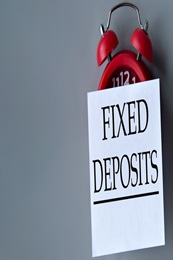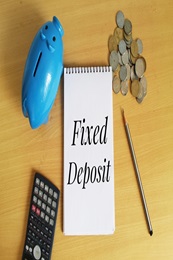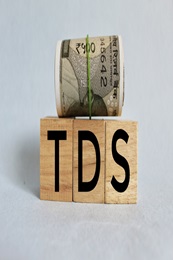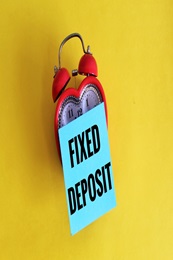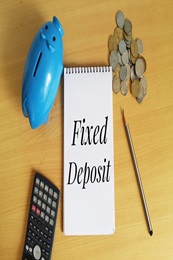Advantages of Fixed Deposits for Small Business Owners
April 15, 2025

Starting and expanding a small business requires financial support. As an entrepreneur, you may be wondering about the best financing options available to you. One such option that can provide stability and growth opportunities for your business is Fixed Deposit (FD). In this blog, we have explained the advantages of Fixed Deposits for small business owners.
1. Stable Returns and Precise Forecasting
One of the key advantages of FDs for small business owners is the assurance of stable returns. When you open an FD account, you deposit a specific amount of money for a predetermined period at a fixed interest rate.
This fixed interest rate allows business owners to precisely forecast their returns over the duration of the deposit.
2. Liquidity Management and Capital Use Optimisation
Business owners can improve cash flow by staggering their FD investments. This means setting up several FDs with different maturity dates, so funds become available at regular intervals. The strategy is commonly termed as FD Laddering.
This approach avoids large, lump-sum withdrawals and ensures access to money when needed. Additionally, by reinvesting the matured FDs or using the funds for business growth, owners can better manage their capital and support expansion.
3. Diversification and Risk Reduction
Diversifying investments helps reduce risk. Including Fixed Deposits (FDs) alongside assets like equities, bonds, or mutual funds enhances overall portfolio resilience. Unlike market-linked investments, FDs protect the principal from fluctuations, making them ideal for risk-averse entrepreneurs.
Investing in FDs safeguards capital from market volatility and economic uncertainties, ensuring financial stability.
4. Tax Benefits
FDs also offer tax benefits as the interest income is subject to standard tax rates.
One such FD tax exemption is the deduction on FD interest available under Section 80 TTB of the Income Tax Act. According to this provision, senior citizens (individuals aged 60 years and above) are eligible for TDS exemption of up to ₹50,000 on FD interest in a financial year. Please note that this TDS exemption on FD interest is applicable for FY 2024-25 (till March 2025). For FY 2025-26, the current TDS exemption limit has been hiked to ₹50,000 for regular citizens and ₹1 lakh for senior citizens. If the interest income is more than this threshold in a financial year, 10% TDS would be imposed on the interest income. If the individual is unable to provide PAN information to the bank, TDS of 20% would be levied on the interest earned.
Timing FD maturities and withdrawals strategically can help business owners manage tax liabilities and maximise after-tax returns.
Let’s consider an example to understand the benefits of fixed deposits for small business owners -
Scenario:
a) Mr. Rao runs a small IT services firm and wants to ensure that he has sufficient cash flow to cover his operational expenses during slower months.
b) He decides to invest ₹8 lakhs in an FD with at an interest rate of 8%.
c) This fixed deposit acts as a buffer and ensures that he has a steady inflow of funds even when business is slow.
d) By using FDs in this way, Mr. Rao maintains financial stability, reduces stress from cash flow fluctuations. He can focus on growing his IT services firm without worrying about short-term cash shortages.
Final Thoughts
Fixed deposits come with a range of advantages for small business owners in India. By incorporating FDs into their long-term financial planning, small business owners can maintain liquidity, manage cash flow effectively, and support their business's success.
To ease your daily business transactions, Ujjivan SFB offers a comprehensive suite of Current Accounts. Each account comes with its own set of advantages designed to make your financial life better.
April 15, 2025
FAQs
1. Can small business owners open FD accounts in the name of their businesses?
Yes, small business FD accounts can be opened by owners in the name of their businesses.
How does FD for small business compare to other investment options?
Opening an FD for small business offers stability and fixed returns, making them less risky compared to equities or real estate. They are ideal for preserving capital and ensuring steady income without market risk.
3. Are FD interest rates for small businesses different from personal FD interest rates?
Yes, many banks offer higher interest rates on fixed deposits for small business owners compared to personal FDs, accommodating larger amounts and business needs.
Latest Blogs

Telangana Housing Board & KPHB Colony: A Guide to Affordable Urban Housing in Hyderabad
March 14, 2025
As Telangana continues its rapid urbanisation journey, two key housing entities—Telangana Housing Board (THB) and Kukatpally Housing Board Colony (KPHB)—have played critical roles in shaping the state's real estate ecosystem.

Does Checking CIBIL Score Frequently Lower Your Credit Points?
April 07, 2025
Imagine you're planning to apply for a home loan, a credit card, or even a car loan. Naturally, you want to ensure your CIBIL score is in good shape before proceeding.

Explained: Can NRIs Buy an Agricultural Land in India?
April 03, 2025
Real estate investment is often a top priority for Non-Resident Indians (NRIs) looking to retain strong financial ties to India.

How to Improve Your CIBIL Score from 600 to 750: A Step-by-Step Guide
April 02, 2025
Your CIBIL score is like your financial reputation—banks check it before approving loans or credit cards. If your score is hovering around 600, you might face difficulties in securing credit or may get loans with higher interest rates.

What Happens When You Leave Your Savings Account Unused?
April 01, 2025
Imagine waking up one day to find that your hard-earned money is locked away and inaccessible. Sounds stressful, right? This is precisely what happens when you leave your Savings Account inactive for too long.

